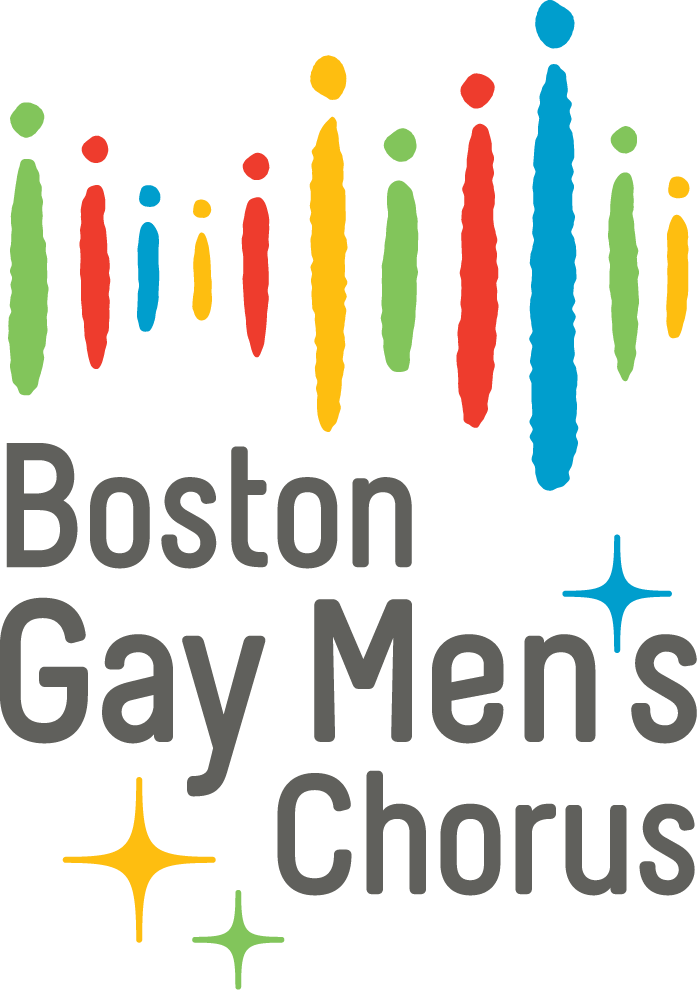The BGMC’s Historic European Tour
Music Triumphs Over Intolerance
On June 22, 2005, 120 members of the Boston Gay Men’s Chorus flew to Berlin, Germany to kick of our first European Tour. Over the next ten days, the Chorus celebrated gay pride in Berlin, made history as the first gay organization to perform in Poland, and helped raise money and awareness for domestic partnership legislation in the Czech Republic. Reuben Reynolds, the BGMC’s music director, said, “When we started planning the tour five years ago, we not only wanted to have a great travel experience, but we also wanted to make a positive impact on the local communities we were visiting. The tour proved that the power of music transcends language and cultural barriers and just brings people together like nothing else.”
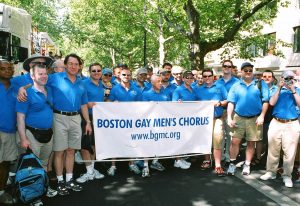 Highlights in Berlin included a joint concert with Rosa Cavaliere, one of Berlin’s gay choruses, marching in the Berlin Christopher Street Day (gay pride) parade, and performing at the Siegessäule monument for a crowd estimated at 400,000. In Prague, the BGMC sang at world famous Dvorak Hall of the Rudolfinum in a concert sponsored by the Czech organization Gay Initiative and was featured in a documentary profile shown on Czech television. But it was the middle stop of the tour that really changed our lives.
Highlights in Berlin included a joint concert with Rosa Cavaliere, one of Berlin’s gay choruses, marching in the Berlin Christopher Street Day (gay pride) parade, and performing at the Siegessäule monument for a crowd estimated at 400,000. In Prague, the BGMC sang at world famous Dvorak Hall of the Rudolfinum in a concert sponsored by the Czech organization Gay Initiative and was featured in a documentary profile shown on Czech television. But it was the middle stop of the tour that really changed our lives.
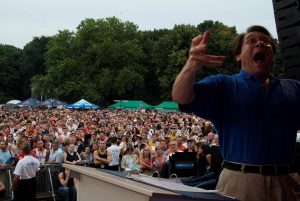
How did the Boston Gay Men’s Chorus find itself in the middle of Poland and the subject of an international news story? ACFEA, our wonderful tour consultants, recommended Wroclaw to us for its beauty, its reputation as an intellectual center, and its terrific concert hall. Located in the southwestern region of Poland, it is also known by its formerly German name, Breslau. It was the perfect mid-way stop for us between Berlin and Prague.
After we arrived in Berlin, we heard reports that a gay pride march in Warsaw had been violent and that there were rumors of a protest brewing about our concert. Some of our German hosts thought we were crazy to go to Poland. Regardless, we left Berlin for a slow six hour bus ride and arrived in Wroclaw late on Sunday evening. As the Chorus descended on the historic town square for a late dinner, we marveled at the architecture and had no idea what was in store for us the next day.
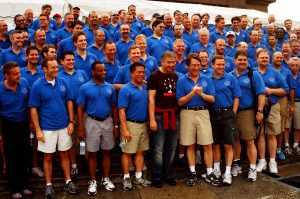 On Monday morning I went down to the hotel lobby for breakfast and noticed that two bright blue police vans were blocking both ends of the hotel driveway. Armed officers in black paramilitary uniforms stood near the vans. Tony Hastings, our stoic British tour manager, intercepted me and said not to be alarmed but the situation was becoming “rather more serious than we anticipated.”
On Monday morning I went down to the hotel lobby for breakfast and noticed that two bright blue police vans were blocking both ends of the hotel driveway. Armed officers in black paramilitary uniforms stood near the vans. Tony Hastings, our stoic British tour manager, intercepted me and said not to be alarmed but the situation was becoming “rather more serious than we anticipated.”
It seemed that an extreme right wing Catholic group named the League of Polish Families had issued a press release which stated that they would purchase all remaining concert tickets in order to occupy the concert hall and force cancellation of the concert. The League had spent a week pressuring the Philharmonic to cancel our concert, so failing that, they were determined to stop it any way they could. They also threatened to form a human chain around the hall to prohibit the Chorus from entering and to throw eggs at us.
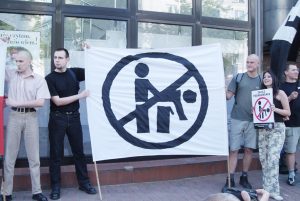 We made the painful decision to suspend ticket sales and the box office was instructed to only honor the 200 tickets bought in advance. Chorus members were warned to travel in small groups, not to wear any clothing that identified them as gay, and to stick close to the hotel. The Hotel Wroclaw, a concrete building from the Communist period looked like a bunker and began to feel like one with our police contingent ominously standing guard. We weren’t sure if the concert would go on and if there would be anybody there to hear it.
We made the painful decision to suspend ticket sales and the box office was instructed to only honor the 200 tickets bought in advance. Chorus members were warned to travel in small groups, not to wear any clothing that identified them as gay, and to stick close to the hotel. The Hotel Wroclaw, a concrete building from the Communist period looked like a bunker and began to feel like one with our police contingent ominously standing guard. We weren’t sure if the concert would go on and if there would be anybody there to hear it.
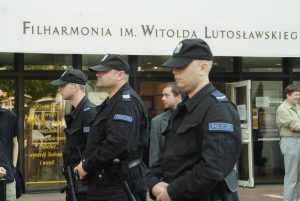 With a dress rehearsal scheduled for 3:00 pm, Reuben, Tony, and I headed to the hall early at about noon to see the situation for ourselves. We arrived not to protesters but to TV crews, radio stations, and newspaper reporters. Instead of a quiet afternoon preparing for the concert, Reuben and I gave more than 25 interviews to the media, explaining our mission and reacting to the controversy. Nearly every question was a variant of “why do you have to have the word “gay” in your name.” The concept of being “out” was new to them. One well-meaning reporter said to me, “We Poles love music and we want your concert to be successful, we just don’t understand why you want people to know you are homosexual.” Reuben and I decided that this must have been how the pre-Stonewall era felt.
With a dress rehearsal scheduled for 3:00 pm, Reuben, Tony, and I headed to the hall early at about noon to see the situation for ourselves. We arrived not to protesters but to TV crews, radio stations, and newspaper reporters. Instead of a quiet afternoon preparing for the concert, Reuben and I gave more than 25 interviews to the media, explaining our mission and reacting to the controversy. Nearly every question was a variant of “why do you have to have the word “gay” in your name.” The concept of being “out” was new to them. One well-meaning reporter said to me, “We Poles love music and we want your concert to be successful, we just don’t understand why you want people to know you are homosexual.” Reuben and I decided that this must have been how the pre-Stonewall era felt.
Although the concert hall was only 4 blocks away from the hotel, the police insisted that for our safety, we be transported to the rehearsal in our unmarked tour buses. Only one bus at a time was allowed to travel and each had a police escort. As the bus pulled up to the hall, more than 20 police stood in front of the building as choristers went from the bus to the stage door. An empty lot next door had five more blue police vans filled with officers and riot gear.
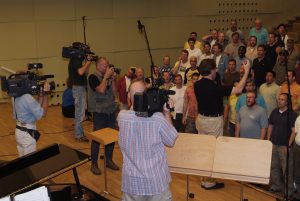 TV crews from Wroclaw, Warsaw, Katowice, Poznan and other cities were set up in the hall, waiting to film our rehearsal for the evening news reports. Reuben and I tried to hide our anxiety, but the guys knew that the situation was potentially volatile. We talked about standing and singing with dignity even if the concert were interrupted by protests and about following Reuben’s instructions if we needed to leave the stage. Once rehearsal began, singers began to relax into the music and enjoy the nearly perfect acoustics of the hall.
TV crews from Wroclaw, Warsaw, Katowice, Poznan and other cities were set up in the hall, waiting to film our rehearsal for the evening news reports. Reuben and I tried to hide our anxiety, but the guys knew that the situation was potentially volatile. We talked about standing and singing with dignity even if the concert were interrupted by protests and about following Reuben’s instructions if we needed to leave the stage. Once rehearsal began, singers began to relax into the music and enjoy the nearly perfect acoustics of the hall.
While the Chorus was rehearsing, the protesters arrived. They began shouting through bullhorns and unfurled signs and banners with crude anti gay cartoons and black flags with their logo. Only about 20 of them showed up, and a phalanx of police stood between them and the entrance to the hall. Translators told us that they chanted that we carried disease, that we were pedophiles, and that we were there to destroy the Polish family. It was very Fred Phelps!
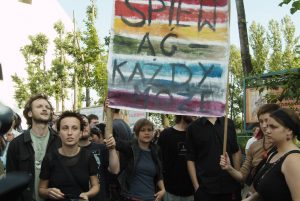 Much to our surprise, a counter demonstration made up of mostly college-age kids began on the other side of the hall. When we saw a pride flag go up, we knew they were on our side! Each side yelled at the other for an hour, with the police firmly in the middle. A crowd of about 200 people watched from across the street. Armed police were posted on nearby roofs. As it became clear that there wouldn’t be violence, the box office quietly resumed ticket sales to a stream of people who looked legitimate. Chorus members peeked though the lobby windows and took photos.
Much to our surprise, a counter demonstration made up of mostly college-age kids began on the other side of the hall. When we saw a pride flag go up, we knew they were on our side! Each side yelled at the other for an hour, with the police firmly in the middle. A crowd of about 200 people watched from across the street. Armed police were posted on nearby roofs. As it became clear that there wouldn’t be violence, the box office quietly resumed ticket sales to a stream of people who looked legitimate. Chorus members peeked though the lobby windows and took photos.
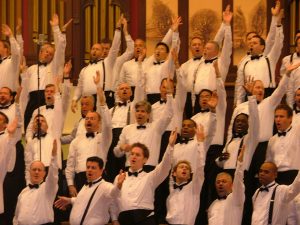 It was finally time for the concert, and our 120 singers entered the hall to a full house. More than 300 tickets had been sold during the protest! Just to be safe, plainclothes security guards provided by the hall were stationed about strategically. TV cameras were positioned in the aisles. Warm but formal applause followed our opening number, “Free to Love.” Then the Chorus began to sing “Gaude Mater Polonia,” a hymn that has been the unofficial anthem of Poland for hundreds of years. The crowd immediately jumped from their seats and stood silently while the guys sang. Some of the older people in the audience began to cry. We could only imagine how it felt to hear that song, with Poland’s long and complicated history, being sung by a gay chorus. After each number, the applause grew louder and longer. Clearly they were getting our message. We presented the proceeds of the concert, about $2000 US, to a local home for children with HIV/AIDS (we later found out that our donation will keep their program open for almost a year).
It was finally time for the concert, and our 120 singers entered the hall to a full house. More than 300 tickets had been sold during the protest! Just to be safe, plainclothes security guards provided by the hall were stationed about strategically. TV cameras were positioned in the aisles. Warm but formal applause followed our opening number, “Free to Love.” Then the Chorus began to sing “Gaude Mater Polonia,” a hymn that has been the unofficial anthem of Poland for hundreds of years. The crowd immediately jumped from their seats and stood silently while the guys sang. Some of the older people in the audience began to cry. We could only imagine how it felt to hear that song, with Poland’s long and complicated history, being sung by a gay chorus. After each number, the applause grew louder and longer. Clearly they were getting our message. We presented the proceeds of the concert, about $2000 US, to a local home for children with HIV/AIDS (we later found out that our donation will keep their program open for almost a year).
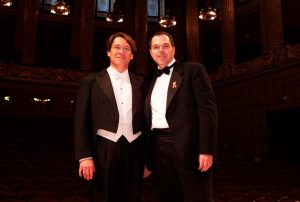 By the time the Chorus started in with several Gershwin selections, the crowd had loosened up and was clapping along. At the end of the concert, the audience leapt to its feet and began a ten minute standing ovation, all clapping in rhythm. The guys left the stage, came back for an encore, the ovation continued, and Reuben brought them back to sing two more. Nearly everyone — singers and audience alike — were crying tears of joy and relief.
By the time the Chorus started in with several Gershwin selections, the crowd had loosened up and was clapping along. At the end of the concert, the audience leapt to its feet and began a ten minute standing ovation, all clapping in rhythm. The guys left the stage, came back for an encore, the ovation continued, and Reuben brought them back to sing two more. Nearly everyone — singers and audience alike — were crying tears of joy and relief.
The next morning, the entire front page of the newspaper was devoted to our concert and the protest. At the end of the article, the reporter made the personal comment that on behalf of his countrymen, he was embarrassed by the behavior of the protesters and said that “music triumphed over intolerance.” As we boarded busses for our long drive to Prague, we waved goodbye to the police still guarding us, and settled back in our seats with relief and pride. Our final encore had been “Everything Possible” and the lyrics “you can travel any country where your heart leads…” had never felt more alive to us.
— Steve Smith
Executive Director (1994-2010)
Boston Gay Men’s Chorus
